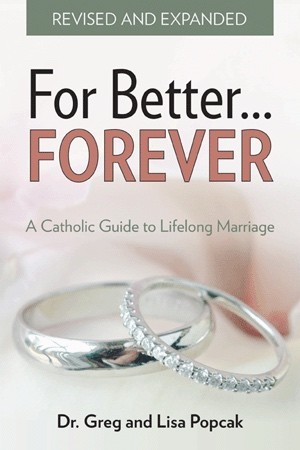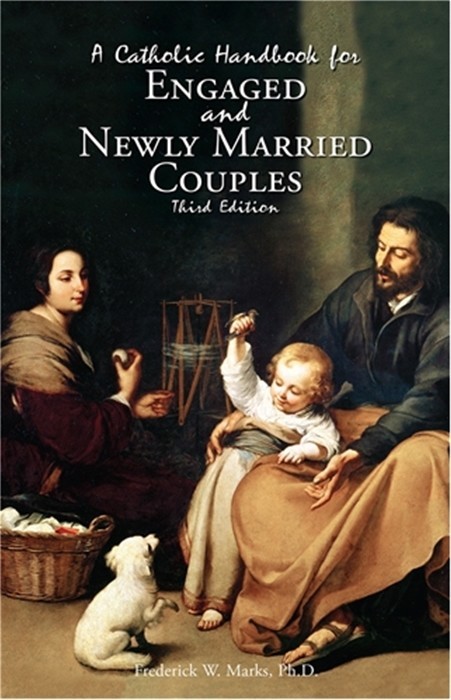The Sacrament of Holy Matrimony
Christ himself elevated the natural institution of marriage to the dignity of a sacrament during his public ministry.
He worked his first miracle at a wedding (John 3:1-11) and he taught that marriage in the New Covenant is permanent and holy (Matthew 19:3-9). The apostles taught on the beauty and significance of marriage throughout the New Testament (1 Peter 3:1-12). St. Paul even taught (Ephesians 5:21-33) on the mystery of the relationship between the members of the Church and Christ the bridegroom as analogous to the relationship between husband and wife in the sacrament of Marriage.
Christian Marriage is a sacrament that orders the husband and wife to serve one another. This service is based on the Christian virtue of charity and is done in a spirit of care and concern for the good of the spouse and child(ren) following the example of Christ. If this sacrament provides grace for salvation to the individual, it is only as a secondary fruit. The principle effect of the grace of the sacrament serves to strengthen the couple’s unity and deepen their love and affection so that their loving service assist them in growing closer to God. The ultimate goal of marriage is the same as Christian life; to respond to God’s grace and be happy with Him in heaven forever.
Made to love… made for family
God is the source of love and so his role in the family is irreplaceable. In fact, “man would not exist were he not created by God’s love and constantly preserved by it.” (Pastoral Constitution on the Church in the Modern World, 19) What is a family? More importantly what is the Christian family? It is the loving union of one man and one woman with the purpose of the procreation and upbringing of children. In the Christian view marriage is a sacrament, instituted by Christ.
Some Pharisees approached him, and tested him, saying, ‘Is it lawful for a man to divorce his wife for any cause whatever?’ He said in reply, ‘Have you not read that from the beginning the Creator ‘made them male and female’ and said, ‘For this reason a man shall leave his father and mother and be joined to his wife, and the two shall become one flesh’? So they are no longer two, but one flesh. Therefore, what God has joined together, no human being must separate.’ They said to him, ‘Then why did Moses command that the man give the woman a bill of divorce and dismiss [her]?’ He said to them, ‘Because of the hardness of your hearts Moses allowed you to divorce your wives, but from the beginning it was not so. I say to you, whoever divorces his wife (unless the marriage is unlawful) and marries another commits adultery.” -Matthew 19: 3-9
The purpose of marriage serves not only the care of children, but also the “communion and good of the couple.” (Compendium of the Catechism, 338) The institution of the family has been the foundation of society throughout human history. The family passes on culture, customs and faith to each generation. Put simply, where the family goes, there goes society. Members of the modern family face an uphill battle to remain faithful to the sacred trust they have received from God to be a living school of love. As Vatican II emphatically stated: “The well-being of the individual person and of human and Christian society is intimately linked with the healthy condition of… marriage and family.” (Vatican II, Pastoral Constitution on the Church, 47).
The Catholic family and fidelity
"The Church is God's family in the world.” -Benedict XVI, Deus Caritas Est, 25
In this family there are four units. The largest unit is the universal Church led by the pope. Then there is the diocese with the bishop as its head. Next is the parish with the pastor as its ‘father’. The smallest unit is the domestic church; the Catholic family led by the mother and father who work together to lead each other and their children in striving for holiness. “Christians and all men who hold [the family] in high esteem sincerely rejoice in the various ways by which men today find help in fostering this community of love and perfecting its life, and by which parents are assisted in their lofty calling” (Vatican II, Pastoral Constitution on the Church, 47). Support for family life is of highest importance for Catholics.
Marriage requires mutual fidelity for life. The permanence of the marital bond gives spouses the freedom of marital life lived without fear of abandonment and helps them to persevere in fidelity to one another and to God.
The key to understanding the indissoluble (permanent) character of marriage is not to see it as a rule imposed from the outside, but instead as an essential promise which flows from the vows and nature of marriage. “To opt for marriage in this way expresses a genuine and firm decision to join paths, come what may. Committing oneself exclusively and definitively to another person always involves a risk and a bold gamble.” (Pope Francis, The Joy of Love, 132) In this sense marriage may be the riskiest thing one can do in the course of one’s life. However, it is worth the risk because, “this ‘yes’ tells them that they can always trust one another, and that they will never be abandoned when difficulties arise or new attractions or selfish interests present themselves.” (Pope Francis, The Joy of Love, 132)




